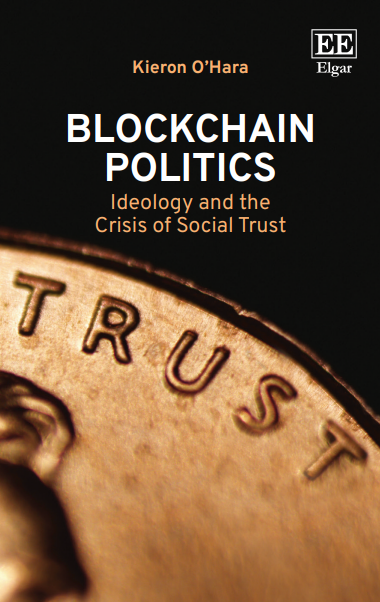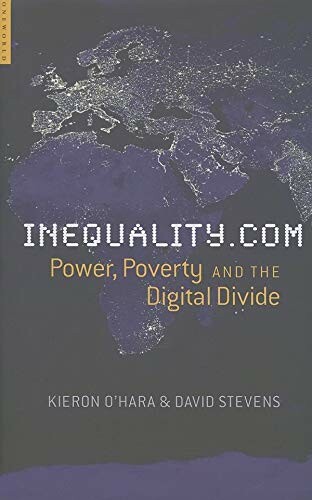Politics
 Books relating to Politics
Books relating to Politics
Blockchain Politics

Likening contemporary extremes of far-right populism and identity politics to 17th century Peasants and Puritans, Blockchain Politics examines the enduring importance of trust in political life. Kieron O’Hara develops a new theory of trust to analyse how these extremes undermine social accord and weaken representative democracy, and to suggest remedies.
Conservatism

The real meaning of ‘conservative’ – today denoting groups as diverse and incompatible as the religious right, libertarian free-marketeers and free-spending neo-conservatives – has been lost to politics. Yet the original conservative ideology, first developed in the eighteenth century by Edmund Burke, was concerned with managing change. Kieron O’Hara argues that genuine conservatism has its own relevance in a complex and dynamic world where change is rapid, pervasive and dislocating. Conservatism transcends traditional politics, and has surprising applications – not least as the most appropriate and practical response to climate change.
Democratising Conservative Leadership Selection

Democratising Conservative leadership selection traces the effects of democracy on the British Conservative Party, including analysis of the original undemocratic ‘system’ whereby a leader ’emerged’ from a shadowy process of consultation, and of the six elections between 1965 and 1997 where the parliamentary Conservative Party alone chose the Party leader. This historical perspective is followed by in-depth analysis of the three contests since 2001 that have taken place under the ‘Hague rules’, according to which ordinary Party members have the final say. This is the most comprehensive account yet published of the operation of those rules on the Conservative Party and the legitimacy of its leadership, and of the 2005 election of David Cameron.
After Blair

In David Cameron’s review of the first edition of this book, he praised its ‘road map for a sustained Conservative recovery’ and is now following its prescription, leading to a successful Tory revival. Revised and significantly expanded this is the first book to consider Cameron and the Tories’ future. Calling the first edition ‘a compelling, and often persuasive read’, David Cameron’s detailed review of “After Blair” has been held up by the “Guardian” as the best description of his policies yet. His strong association with the book continued when he referred to it in his famous Keith Joseph lecture last spring. In this revised and expanded edition, O’Hara places Cameron in the context of Conservative history, explaining Cameron’s intellectual and political roots in a way that no other book has. Including new, exclusive interviews with Cameron’s principal advisors and strategists, a summary of the threat from the right to the Tories’ new direction, and an analysis of Cameron’s potential, this is the essential book on British politics today.
inequality.com

We can now shop, vote, congregate – some would even argue we can have sex – on an entirely new plane of existence: the Internet. While this new place provides illimitable opportunities, it also raises new concerns. In this revelatory new book, O’Hara and Stevens tackle the thorny issues which crop up in this unprecedented boundaryless, and often unregulated space. Arguing that the lack of Internet access can deprive the poor of services and information that are essential to their status as equal citizens in society, they also discuss uncertainty about future technologies undermines our personal liberty – we can never be sure how the web of information we leave around ourselves will be used in years to come. Bringing together the important social, political and philosophical issues surrounding the Internet, this book will grip the attention of anyone who wishes to understand the broader issues involved everytime they click on their web browser.
After Blair

Sets out a philosophy of conservatism that is adaptable for the post-New Labour, post-Thatcher era, based on Edmund Burke and Michael Oakeshott, and scepticism about the ability of rationalist social engineers to achieve their stated aims without risky unintended consequences. It boils conservatism down to two principles: the knowledge principle, that society is too complex and dynamic to model with any confidence; and the change principle, that rationalist thought persistently undervalues existing institutions and practices, and overvalues abstract and potential schemes, so that change always carries a risk.
The Referendum Roundabout

A lively and sharp critique of the role of the referendum in modern British politics. The 1975 vote on Europe is the lens to focus the subject, and the controversy over the referendum on the European constitution is also clearly in the author’s sights.
 Articles relating to Politics
Articles relating to Politics
Blockchain Politics: Abstract and Analytic Table of Contents
2026
Themes: Conservatism, Extremism, Trust
Category: Extended abstract, Open access
Privacy and digital modernity: liberal and conservative approaches to technology, personalisation and the individual
Martin Beckstein & David McGrogan (eds.), The Conservative Critique of Liberalism, 89-124
2026
Themes: Conservatism, Digital modernity, Privacy
Category: Book chapter, Peer reviewed
Read the articleBurkean conservatism, legibility and populism
Journal of Political Ideologies, 26(1), 81-100
2020
Themes: Conservatism, Politics
Category: Journal article, Open access, Peer reviewed
Links have sometimes been drawn between conservatism and populism, but the radical nature of the latter, focused on change as a direct end, means that they cannot be connected so easily. This article argues that nevertheless, conservative thinking of the Burkean tradition can be used to understand, and possibly address, populist concerns. This is not because conservatism is biased towards the status quo – the conservative argues, on the contrary, that innovators, whether rationalist or populist, undervalue the status quo, and are therefore biased against it. Rather, the conservative values the legibility of a person’s society or culture to that person, and diagnoses many populist grievances as resulting from innovation making society less legible to the individuals within it.
Read the article Download the articleData-driven government: the triumph of Thatcherism or the revenge of society?
Antony Mullen, Stephen Farrall & David Jeffery (eds), Thatcherism in the 21st Century: The Social and Cultural Legacy, 55-73
2020
Themes: Conservatism, Digital modernity
Category: Book chapter, Peer reviewed
Margaret Thatcher’s statement that ‘there is no such thing as society’ has overshadowed Conservative Party politics since the 1980s, and has been the subject of exegesis and attempts at repudiation ever since. This chapter considers the statement in the context of Angus Maude’s critique of ‘society’ as a statistical abstraction, which comes, erroneously, to be taken as an agent in its own right, able to take on the responsibilities of individuals to their communities and ‘little platoons’, and ultimately to become the end of policy itself. This digital modernity, nascent in Maude’s and Thatcher’s day, is becoming increasingly influential, thanks to data-based policy and data-driven agency. The chapter argues that Maude’s subtler analysis still yields a conservative critique of digital modernity, whereas the less nuanced neoliberal individualism valorised by Thatcher may be seen as one of its enablers.
Read the articleThe conservative reaction to data-driven agency
Mireille Hildebrandt & Kieron O'Hara (eds.), Life and the Law in the Era of Data-Driven Agency, 175-193
2020
Co-authors: Mark Garnett
Themes: Conservatism, Digital modernity
Category: Book chapter, Peer reviewed
Political issues pertaining to data-driven agency and the use of ‘big data’ to make decisions about people’s lives are usually seen through the lens of liberalism. A conservative examination of data-driven agency requires a different lens. This chapter adopts the perspective of evolving modernity. It considers the philosophy of three major conservative thinkers, Edmund Burke, Alexis de Tocqueville and Michael Oakeshott, in the context of the problematisation of big data contained in Mireille Hildebrandt’s Smart Technologies and the End(s) of Law. Present-day conservatives need to rethink their traditional antipathy to the state, reverting to a Burkean understanding of the public-private distinction, and also to revise views of individual agency in the face of the facilitation of collective agency by networked digital technology.
Read the articleConservatism then and now: review of Scruton, Conservatism
Cosmos + Taxis, 6(3-4), 45-51
2019
Themes: Conservatism
Category: Book review, Peer reviewed
A review of Roger Scruton’s Conservatism: An Invitation to the Great Tradition, arguing that while Scruton’s historical discussion is illuminating, situating conservatism in dialogue with liberalism, his agenda for taking conservatism forward, involving a focus on political correctness and religious extremism, is very limited, not only ignoring a number of other very serious political issues, but also failing to speak to the concerns of non-conservatives.
Read the article Download the articleMargaret Thatcher (1925-2013)
Mark Garnett (ed.), Conservative Moments: Reading Conservative Texts, London: Bloomsbury, 127-136
2018
Themes: Conservatism, Conservative Party
Category: Book chapter, Open access, Peer reviewed
This chapter explores three questions. First, what is the nature of Thatcher’s political philosophy, and in particular the uncompromising statement that ‘there is no such thing as society’? Second, can we judge whether her policies in office were consistent with a tenable understanding of conservatism? Third, can we trace some of the antecedents of her thinking, and place her, tentatively at least, within a tradition?
Read the article Download the articleConservatism, epistemology, and value
The Monist, 99(4), 423-440
2017
Themes: Conservatism
Category: Journal article, Peer reviewed
A series of recent papers has discussed whether conservatism has a distinct set of values (substantive), or whether it consists in an attitude to shared values (adjectival). This paper argues that adjectival conservatism is a genuine type of conservatism, consistent with the Burkean tradition, in accordance with the idea that conservatism is concerned with change, and arguable using public reason. A version of adjectival conservatism derived from epistemological scepticism, consisting of a knowledge principle and a change principle, is presented. It is shown to (a) be resistant to arguments that adjectival conservatism is not a genuine type of conservatism, and (b) contain a distinct ideological programme, and not be restricted to a mere commentary on the activities of other ideologues.
Read the articleThe many-headed e-monster
IEEE Internet Computing, 17(6), 88-92
2013
Themes: Politics
Category: Journal article, Open access, The Digital Citizen
Across the world, politics has been transformed by e-populism, where parties support freedom of the Internet, direct democracy, transparency and free speech. E-populists have proved powerful opponents, upsetting governments in Italy, Egypt and elsewhere. But can e-populism succeed in creating inclusive, constructive government? Does the power of the Internet need to be mitigated by alternative institutions?
Read the articleSocial machine politics are here to stay
IEEE Internet Computing, 17(2), 87-90
2013
Themes: Politics, Social machines
Category: Journal article, The Digital Citizen
The US has always been ahead of the curve in digital politics. Its mega-campaigns collect and spend absurd quantities of cash, they last forever, and they’re run by the candidates, not the parties. Obama’s campaign was Obama’s, not the Democratic Party’s. The US provides space for entrepreneurialism and experimentation, not least in the use of technology. Other nations will follow its lead. And the stories were microblogging, social networks, and big data.
Read the articleWelcome to (and from) the Digital Citizen
IEEE Internet Computing, 17(1), 92-95
2013
Themes: Computing/The Internet, Politics
Category: Journal article, Open access, The Digital Citizen
In this introductory Digital Citizen column, Kieron O’Hara explores some issues regarding the definition of “digital citizenship,” focusing on the associated rights and responsibilities, the value to be gained from citizenship, and the problems caused by conflict.
Read the articleReview of Honderich, Conservatism
Contemporary Political Theory, 5(3), 354-358
2006
Themes: Conservatism
Category: Book review, Open access
Review of Ted Honderich, Conservatism: Burke, Nozick, Bush, Blair?
Read the article Download the article Talks relating to Politics
Talks relating to Politics
Old Man Shouts at Cloud – Could Trump turn off Europe’s Internet?
The Bunker podcast
August 13th, 2025
Themes: Computing/The Internet, Politics
Listen5 AIMS: Ideology and Divergent Interpretations of Trustworthy AI
SPRITE+ Lunch and Learn talk
March 19th, 2025
Themes: Artificial Intelligence (AI), Digital modernity, Politics, Trust
Category: Invited talk
WatchCan Conservatism Survive the 21st Century
Academy of Ideas, London
December 6th, 2011
Themes: Conservatism
Category: Panel
WatchTransparency, Open Data and Trust in Government
Web Science Conference
June 23rd, 2012
Themes: Computing/The Internet, Politics, Trust
Category: Conference talk
Watch Kieron O'Hara
Kieron O'Hara